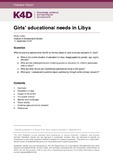| dc.description.abstract | Girls’ – and boys’ – education in Libya has been affected by the ongoing conflict. Seven years on from the 2011 crisis, three governments compete for power, with deep divisions along political, geographic, religious and ethnic lines (Freedom House, 2018; OCHA, 2017, pp. 7-8). Fighting continues in populated areas, and there is an environment of deepening vulnerability for the population at large with a proliferation of weapons and autonomous militias, and a rapidly deteriorating economy and public sector (Freedom House, 2018; OCHA, 2017, p. 7). The protracted crisis has damaged vital education infrastructure, and impacted on the education system’s delivery, outreach, coverage, retention and quality. In 2017 the majority of households with school-aged children (87.3%) reported facing no barrier to accessing education; IDP households were more likely to report barriers. For those that did report barriers, the most common challenges were the distance to school and not being able to afford educational services. Girls are particularly vulnerable to violence and insecurity in Libya. Their educational needs are shaped by multiple, intersecting factors such as location, tribal affiliation, presence of armed militias and organised crime, social norms driving gendered experiences including harmful practices such as child marriage, and the lack of adequate school WASH facilities, among others (Larsson and Mannergren, 2014, p. 21). | en |

